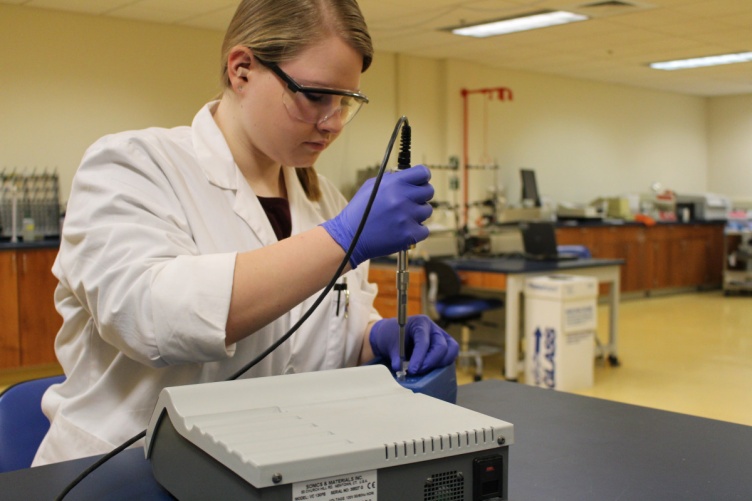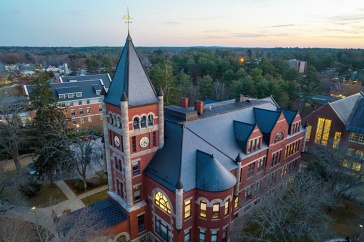
Most college students today are well aware of the benefits of an internship, like test driving your major and adding to your resume. For students in biology and biotechnology, getting their hands in lab research is great for gaining experience and resume building — and it also sets them apart when seeking jobs or further education.
Kyle MacLea, assistant professor of biological sciences and biotechnology, knows the value of student research, which is why he seeks out funding to make more opportunities available to his students.
“For students interested in going to work in the biotech industry, commercial or state labs, or pursuing graduate education, documented first-hand experience working at the lab bench is invaluable,” MacLea said. “Research can be expensive, though, and so support from federal or other grants make it possible for our students to gain the experience they need to be successful in their next steps.”
MacLea’s most recent grant was awarded in spring 2017 from the New Hampshire chapter of the IDeA Networks of Biomedical Research Excellence (NH-INBRE). The grant funded an ongoing collaborative project researching yeast prions at UNH Manchester, Great Bay Community College, Manchester Community College and Nashua Community College.

“The research is based on an easy-to-use model using yeast with infectious prion proteins to fundamentally understand the biochemistry of how these proteins work,” explained MacLea.
A prion is an abnormally formed protein with properties that, once formed, influences other proteins to take that abnormal form. Yeast prions could possibly hold answers to questions about human neurodegenerative diseases such as Alzheimer’s, Huntington’s and Parkinson’s.
“We were looking at the Sup35 gene. A portion of that gene is known to influence prion propagation and the abnormal development of prion proteins,” explained Rachel Main ‘17, a graduate of Great Bay Community College who is now a biotechnology major at UNH Manchester. “The Sup35 prion gene, when expressed, can be passed down to daughter cells. We wanted to see if we could manipulate the genes in some way by mutating them and what would happen to the prions passed on to the daughter cells.”
The prion most familiar to us is Mad Cow Disease. There are also non-infectious proteins (called amyloids) that share the same abnormal shape as prions and are found in human neurodegenerative illness such as Alzheimer’s, Huntington’s and Parkinson’s.
“There does seem to be a link between non-infectious amyloids and these neurodegenerative disorders,” explained Deb Audino, biotechnology professor at Great Bay Community College.
The prion has five repeating sections and each college is assigned to study one repeat. Each lab follows the same protocol to extract and mutate the DNA within their repeat. The students and professors meet monthly to discuss their findings and the science behind their work.
“When I went to Professor MacLea with prior research experience, he encouraged me to join the project,” said Main. “He gave me the courage to be more independent and pursue the research. I was able to make decisions on my own which helped build my confidence.”
In addition to the research, Main also completed two summer internships with New England BioLabs in Ipswich, Mass. She will continue the research through the fall term serving as a mentor to new students until she graduates in December 2017.
Brittany Warren ’17 worked alongside MacLea and Main on the research.
“I am a huge believer in working outside the classroom, because you never know how much you will learn not only about research, but about your own interests and talents,” said Warren.
Having just graduated from UNH Manchester’s biotechnology program in May, Warren feels well prepared for the competitive job market.
“Working on this project for a year gave me more experience in the real-world that translates to occupational training on my resume, which most employers look for,” said Warren.
For Audino, she sees a great benefit that students can continue their research when they move from an associate to a bachelor’s degree. UNH’s Pathways Program makes it easier for students from the New Hampshire Community Colleges to transfer into the biotechnology program at UNH Manchester.
“This research project makes the bridge between the two-year and the four-year degree stronger,” said Audino.
At the end of the 2016-2017 academic year, the students were invited to present their research findings at the annual NH-INBRE meeting. It was their largest meeting with over 200 attendees and 90 student posters. The research will continue through this year at all four of the college campuses.
Interested in research-driven education in the sciences?
Learn more about the biological sciences program
Learn more about the biotechnology program
-
Written By:
Kim Wall | UNH Manchester
















































